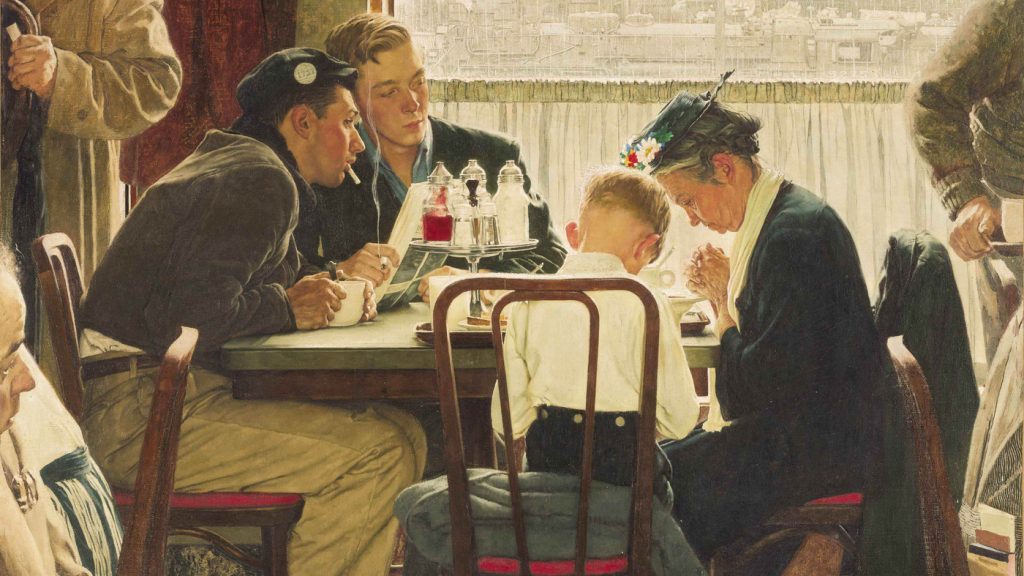Blog Post
Crunchy Cons: The Case for a Conservative Counterculture
By Jonathon Van Maren
This column was first published in 2017.
After reading and reviewing traditionalist writer Rod Dreher’s much-discussed manifesto The Benedict Option this year (and his memoir The Little Way of Ruthie Leming earlier), I decided that I should probably read a few more such books—books that didn’t simply make the case for one political philosophy over another, but focused on what being a conservative looked like in a society that has spent decades trashing anything that resembles “culture.” Books, in other words, that focused less on who to vote for on more on how to live. And that was how I ended up reading Dreher’s first book, published nearly a decade ago—Crunchy Cons: How Birkenstocked Burkeans, Gun-Loving Organic Farmers, Hip Homeschooling Mamas, Right-Wing Nature Lovers, And Their Diverse Tribe of Counter-Cultural Conservatives Plan to Save America (Or At Least the Republican Party.)
That’s quite the title to live up to, but Dreher does a pretty good job of it—and cuts himself no slack. He examines nearly everything that makes up our daily lives, with chapters on consumerism, food, home, education, the environment, and religion—and ending with a finale that foreshadowed his most recent book, “Waiting for Benedict.” The book is filled with uncomfortable truths, and less comfortable questions. What is conservatism, Dreher asks, and what are we conserving? Have we traded things that matter for lives of convenience? Why do conservative politicians consistently defend the very same corporations that cut the heart out of small towns and bully governments into suppressing religious liberty?
Dreher starts off by making a point that seems at first bizarre, and then intuitive once you stop to think about it for a moment: The original hippies have a lot in common with today’s traditionalists. That is, the ones who weren’t interested in the sex, drugs, and rock n’ roll, but were interested in going back to their roots, exploring concepts of meaningful community, and stepping off the consumerist conveyer belt. Conservatives used to be interested in precisely the same things, Dreher points out. It reminded me of another book I read recently, Kevin Shultz’s Buckley and Mailer: The Difficult Friendship that Shaped the Sixties. Both Buckley, arguably the founder of political conservatism, as well as Norman Mailer, the infamously left-wing writer, raged against the war of the liberal central planners against charm or beauty or a sense of “place.” These planners, Buckley and Mailer agreed, were willing to destroy all for the sake of cold efficiency, and there was no problem that the technocrats felt couldn’t be solved with some brains and a chart.
There are other strange examples of this, too. The controversial Canadian Wiebo Ludwig, who moved his family into the Albertan wilderness decades ago to create a self-sustaining Christian community far away from the buzz and snarl of modernity, was lauded by the pseudo-Marxist journalist Chris Hedges in his The Wages of Rebellion: The Moral Imperative of Revolt. Hedges’ book recorded the clashes between eccentrics and traditionalists and multi-national corporations and industries, and while he approvingly cited Ludwig’s war against the oil industry that Ludwig claimed was poisoning his family and his livestock (and for which he served time in prison prior to his death), he noted that he strongly disagreed with Ludwig’s Christian beliefs. Those who value community, tradition, and our natural heritage, it seems, can meet from opposite sides of the spectrum.
(In case you worried that Dreher was defending the hippies of the Sexual Revolution, he quotes one traditionalist’s brilliant analysis of Woodstock: “It was the very acme of consumerism. You had several hundred thousand people willingly reducing themselves to a condition of infantile dependence and passivity in the expectation that competent adults would take care of their physical needs. It was that, more than the doping and the fornicating, that was really the most disgusting and even frightening about it.”)
Dreher also highlights the fact that many conservatives see the preservation of our natural heritage as paramount, especially if one recognizes it as God’s Creation. The radical population control activists, big government fanatics, and environmentalists have often caused conservatives to turn up their noses, but one can be a dispositional conservationist while rejecting much of the anti-Christian agenda the environmentalist movement promotes. Traditionalists can believe in more and bigger national parks, restrictions on pollution, projects to protect endangered species, and moves to protect our national heritage from big corporations who focus on the bottom line as their primary concern. Christians would simply call that “biblical stewardship.” Or as Tolkien once put it: “More green. Less noise.”
Dreher has much to say about having a “sense of place,” a home that brings a sense of belonging and rootedness. The big McMansions and cardboard cut-out post-war box homes, Dreher says, are stifling. People need to have a connection with where they live—it reminded me of a quote I read recently, posed by a traditionalist: If we don’t make our towns beautiful, who will want to defend them? It also brought to mind one of the more personal aspects of globalization: sky-rocketing real estate prices. In most Canadian cities, foreign buyers have driven housing prices so high that scarcely any of my friends will be able to buy a house in the cities where they grew up. Politicians who wish to alleviate voter resentment should be paying close attention to that problem, especially considering how important it is for so many people to live and work where they were born and raised.
Dreher’s book actually encouraged me to do a little personal research about the little town where I’m putting down my own roots. I was born in Washington State, raised in the Fraser Valley of British Columbia, attended university in Vancouver, and then moved to Calgary to begin working for the Canadian Centre for Bio-Ethical Reform. From there, I was sent East to begin our office in Ontario, and have now finally settled in Southern Ontario in a community that my own family moved to prior to my arrival. My original roots are not here, but my newborn daughter’s roots are—and she will, God willing, grow up in a farmhouse on a little plot of land that, I discovered, is right next to the site of the Battle of Malcom’s Mills, a War of 1812 skirmish (that actually took place in 1814) that resulted in a little cluster of decaying gravestones near the gas station a few minutes from our house. Knowing that, somehow, made me feel as if I understood the “place” that much more.
Education, of course, is one of Dreher’s passions, and one he has repeatedly written about. He advocates for homeschooling or solid private Christian education, both of which he and his own family have utilized. The socialization children undergo in public schools, he writes, is one that is profoundly destructive, especially considering the casual hookup culture and pervasive pornography. He notes that there is enormous pressure on young girls to “service young boys”—a chilling way to put it. But as Nancy Jo Sales wrote in her devastating book American Girls: Social Media and the Secret Life of Teenagers, things are far, far worse than they were even a decade ago. Sexting, sexual blackmail, the distribution of imagery that amounts to child pornography, teen suicide—these trends are now so common they have become a way of life for many high schoolers. To offer up our children to these institutions is criminally negligent.
In his chapter on religion, Dreher lays out much of what he expands on in The Benedict Option later. He articulates why Christian beliefs should permeate everything we do, not simply impact our beliefs on a handful of sexual behaviors. In fact, because Protestants caved on this early on—relinquishing the universal Christian consensus of the previous two thousand years on contraception, for example—we ended up losing bigger arguments years later, like the debate over gay marriage. Many Christians nodded along or ignored the sins we wanted to ignore, and condemned loudly the sins we felt least inclined to commit ourselves. Especially on issues like divorce or porn use, many Christian churches remained largely silent so as not to brawl with their parishioners. As one British actress noted laconically in 1910 to someone who was worried about a developing situation of some impropriety: “My dear, I don’t care what they do, so long as they don’t do it in the street and frighten the horses.”
One of the best lines in the book, actually, is Dreher’s shot at mainstream Protestantism: “Was there a place where I could have the liturgical beauty I craved, without having to change my beer-swilling college boy sexual ethics? Yes, there was. And so I became an Episcopalian. It didn’t take, of course.” Of those denominations still holding faithful to the principles of what Dreher later calls “orthodox,” he is more positive: “I’d rather have a staunch self-described ‘Scotch Calvinist’…in my culture-war foxhole than most of the U.S. Conference of Catholic Bishops.” In most churches, he notes, you can warm a pew for decades without hearing anything about abortion, or divorce, or sexual ethics, or anything else that teaches you how to live your life and why. And when the churches abandon these topics, they simply leave them to the culture.
Interestingly, Dreher cites the observations of secular author Phillip Longman, who wrote The Empty Cradle: How Falling Birthrates Threaten World Prosperity and What To Do About It in 2004. Longman describes the cratering birthrate among moderns, and then delivers an interesting prophecy: “Barring unforeseen events, the children of the future are going to come from families so alienated from modern culture that they’re willing to rebel against the economic and cultural determinism that mandates small families. That’s likely to mean religious believers, who will ‘drive human culture off its current market-driven, individualistic, modernist course, and gradually create an anti-market dominated by fundamentalist values.’ Longman thinks that secular liberals like himself had better figure out a way to resist consumerist pop culture and to have more children, or they will cede the future to religious conservatives.”
Longman’s warning brings us back to Dreher’s earlier point, about education: It is essential that Christian parents take responsibility for the education of their own children. Most progressives are having either very few children or none at all, and that is why they are coming after our children so hard. People who contracept throughout their child-bearing years and abort those children who successfully run the gauntlet of chemicals and latex don’t have anyone to pass their values on to, and so they must attempt to force their trash ideologies onto the children of others. This is precisely why governments in Canada and elsewhere are seeking to force “progressive” sex education into Christian schools and are targeting homeschooling groups: Because they are very, very aware of this. As Dreher noted, postmodernism will inevitably die, but we must ensure that it does not take our children with it: “The post-Enlightenment attempt to supplant Christianity with secularist orthodoxy as the guiding framework has, on evidence of collapsing birthrates, failed to create a social system that can reproduce itself.”
Dreher ends Crunchy Cons with his chapter “Waiting for Benedict,” noting that in a time of unparalleled wealth, pyschiatrists say that they’ve never seen people so depressed and unhappy. One reason, he notes, is that “The free market extolled by conservatives as the holy of holies is destroying communities, and turning us all into slaves of the economy.” What, then, is the future of conservatism? Here we turn to John Lukacs, who predicted the current state of politics in America so precisely it is slightly shocking to read: “It may be that in the future the true divisions will not be between Right and Left, but between two kinds of Right; between people on the Right whose binding belief is their contempt for Leftists, who hate liberals more than they love liberty, and others who love liberty more than they fear liberals; between nationalists and patriots…”
Today in the Age of Trump, it often does seem as if hatred holds together the loose coalition of voters who are unified only in their contempt for those on the Left. Grotesque figures like Milo Yiannopoulos are now surging to popularity by calling women “c—s” and acting with such viciousness that it makes his claims to be “playfully trolling” nearly defy belief. And suddenly, there is no behavior that conservatives will not accept, and no character defect we will not celebrate—as long as it is directed at those who despise. It reminds me of something that the novelist Martin Amis once said about his best friend, the late Christopher Hitchens: “Hatred can be a stimulant, but it should never be an intoxicant.”
Crunchy Cons is in many ways an even better book than The Benedict Option. Politics has invaded nearly every sphere of our life, and Dreher delivers a powerful strategy for driving it back into its rightful place. It is, at the end of the day, faith, family, community, and the necessities of life that give us meaning and fulfilment, and Dreher suggests that we perhaps spend more time considering the cost of ignoring these things and investing our time where we can derive the greatest value. I think he’s right—and that makes this a book well worth reading.








